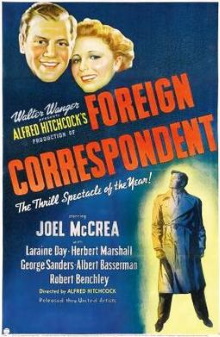We’ve got to run out of Alfred Hitchcock films to watch eventually and this one may even be it as I didn’t find it terribly interesting. It’s a war film that is a hodgepodge of different things: romance, spy intrigue, humor, action and so on and doesn’t gel together well at all. It isn’t at all like Hitchcock’s usual style and while it’s obviously based on World War 2, it uses fictional people and even a country to obfuscate matters, making it even more of a mess. Some critics at the time called it a glorified B-movie and that’s exactly what it feels like to me.
The editor of a US newspaper is frustrated at being unable to get interesting news out of Europe just as World War 2 is expected to break out. He sends John Jones, a local crime reporter with no knowledge of international events to do the job. His first assignment is to interview Dutch diplomat named Van Meer for his views on how likely the war is about to break out and also meets Stephen Fisher who leads a movement promoting peace. Van Meer is evasive however and Jones is smitten with Fisher’s daughter Carol who serves as her father’s assistant. At one event, Van Meer is seemingly assassinated right in front of Jones who pursues the assassin. He is joined by Carol and a British reporter Scott Ffolliott but they lose the assassin’s car near a windmill. While the others go get help, Jones enters the windmill and discovers that the real Van Meer is still alive and has been captured by a gang of spies working for a foreign power. Van Meer is privy to a secret that they want to interrogate him for and soon enough Jones finds himself being pursued by assassins as well.
This film is a little bit of everything to its detriment, so much so that I have no idea what Hitchcock was going for here. Much of the humor is just silly and distracting such as Ffolliott being actually spelled with two lower-case Ls or Jones being given a fake name Huntley Haverstock to better fit the image of a foreign correspondent. The attempts to assassinate Jones are laughable and I have no idea why Carol accepts Jones’ sudden marriage proposal. The actions scenes are ridiculous as well but that’s in keeping with the other films of that period in having the characters being in serious trouble and yet somehow maintain their good cheer and proper manners. Major parts of the plot don’t make any sense at all. Fisher is apparently the head of some kind of activist movement and not even a politician. As such he shouldn’t have any influence at all. Why would there be a treaty with a secret clause in it? The evasive games with naming and then not really naming Germany as the belligerent country are annoying as well and only serve to make the whole debacle feel less real.
The film ends with a disaster at sea scene that is surprisingly well made and finally makes the characters act as if they were in real peril. Yet it is another odd genre shift in a film that is already full of such twists and doesn’t match the tone of the rest of the film at all. For that matter, I’m not sure why Jones is the protagonist when Ffolliott is the one who is arguably more active against the conspirators or why this is a film about reporters when it really wants to be a spy film. Then there’s how the film ends with a call to arms directed at the US and the US national anthem playing over the credits. I interpret this to be Hitchcock’s contribution to the war effort and not something that would normally be part of his personal artistic vision.
While this film is solidly made and has some entertainment value, I don’t like it at all and can’t recommend it. It’s just too much a mixed bag and too much of a product of its time to hold much value today.
